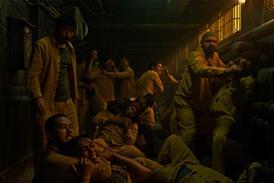Dir: Thierry Piantanida,Thierry Ragobert, Jean Lemire.Can-Fr. 2006. 86mins.
The White Planet
The initialdecision to concentrate on virtually all the mammalian and other animal lifeforms that populate a given location throughout the seasons makes pedagogicalsense and should ensure the film has a robust life as a teaching aid inschools. But such an approach neglects March'srelentlessly anthropomorphic focus on a family of penguins that super-chargedits narrative and left audiences around the world bereft over the creatures'plight and ennobled by their apparent heroism. As such, The White Planet will behard pushed to get a theatrical release anywhere beyond home in Canada, althoughit should do well worldwide on TV as a nature show with especially highproduction values.
Here, the oftenannoying anthropomorphism of March Of The Penguins remains fully intact, with the directorscunningly choosing nearly always to focus on mothers and adorable little cubsof a dozen different species. In fact, we are bombarded by cute shots offrolicking cubs (polar bears, caribou, seals and so on) from beginning to end -and the manipulation is palpable. But the full psychological identificationwith the travails of a single, if composite family, that made last year'sbox-office hit so successful is lacking.
Many of the moraltruisms that afflict the genre are repeated, as when the narrator informs us ina sad and leaden voice that some animals must die in order that others maylive. The voiceover also occasionally strives for a poetic effect but most ofthese attempts end up as cliches.
The music, someof it original or based on Inuit tunes, is interesting but it drowns outeverything else. Other technical credits are first-rate,particularly the often breathtaking photography, but the film could have donewith more of these stunning shots to make it work as a theatrical release.
Surprisingly fora film with such a clearly marked environmental viewpoint on things such as'the great web of life', global warming and the dangers it poses to northerncountries are brought up only for a few minutes at the end. Presumablymentioning such a perspective too early on might have left the audience in abad mood, thus compromising the film's overwhelming need to celebrate "themiracle of life".
Productioncompanies/backers
Gedeon Programmes
Bac Films
France 2 Cinema
Glacialis Productions
National Film Board of Canada
Bac Films
Canal Plus
CNC
Telefilm Canada
Films Seville
Telemuenchen Group
New Atlantis
Cineart
Canadian distribution
Internationalsales
Executiveproducers
Jean-Pierre Saire
Josee Roberge
Producers
Jean Lemire
Stephane Milliere
Jean Labadie
Screenplay
Thierry Piantanida
Stephane Milliere
Cinematography
Thierry Machado
Martin Leclerc
David Reichert
Editors
Catherine Mabilat
Nadine Verdier
Thierry Ragobert
Music
Bruno Coulais


















No comments yet